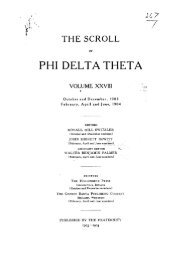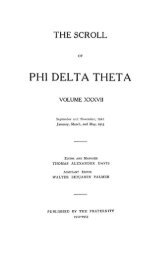1998 Volume 121 No 1–4 - Phi Delta Theta Scroll Archive
1998 Volume 121 No 1–4 - Phi Delta Theta Scroll Archive
1998 Volume 121 No 1–4 - Phi Delta Theta Scroll Archive
You also want an ePaper? Increase the reach of your titles
YUMPU automatically turns print PDFs into web optimized ePapers that Google loves.
CASE<br />
Dr. Michael Benitez<br />
dug deep to turn<br />
popular myth on Its<br />
head: Poe didn't die a<br />
drunk in the gutter.<br />
by Amy Pelsinsky<br />
ognized. Benitez disagrees." Most people<br />
have in their mind the Hollywood 'Old<br />
Yeller' version: foaming at the mouth, a<br />
raving lunatic tied to the stake so no one<br />
gets near them," he says. The reality is<br />
that most people don't recall being exposed<br />
to a rabid animal, and death<br />
comes fast—an average of four days after<br />
symptoms begin, he continues. "Even<br />
cases in the 1990s are often not recognized<br />
untn post mortem," he says.<br />
Some historians say Poe was fond of<br />
pets and street animals, providing ample<br />
opportunity for exposure. And, of<br />
course, there was no rabies vaccine in the<br />
1880s.<br />
The symptoms Poe experienced in his<br />
final days are consistent with rabies,<br />
Benitez explains: difficulty swallowing<br />
water, an illness that lasts four days on<br />
average and progresses from an incoherent,<br />
delirious state to lucidity and back<br />
to delirium with wild swings in body<br />
functions, like the heartbeat.<br />
"I don't know for sure," Benitez says,<br />
insisting that his findings are in no way<br />
the final word on the subject. "There are<br />
a lot of problems with the history. Any<br />
conclusion is only as good as the factual<br />
basis."<br />
However, his study does rule out the<br />
most popular myth about Poe's death.<br />
"His dying of alcohol or opiate use or<br />
withdrawal is not correct," Benitez said.<br />
"There is no question he had problems,<br />
but they didn't cause his ultimate<br />
demise." <strong>No</strong>w somewhat infamous for his<br />
report that was published in the Sept.<br />
1996 Maryland Medical Journal—"It increased<br />
the kook factor," he says—<br />
Benitez still receives letters from<br />
historians and scientists alike; not all of<br />
them in agreement. He sometimes teams<br />
up with David Keltz, a one-man Poe<br />
show, to present the clinical side of the<br />
story at medical conferences and school<br />
assemblies. Stops have included the Na-<br />
tional Association of<br />
Medical Examiners'<br />
meeting in Baltimore<br />
last fall and the Medical<br />
Humanities Hour, a<br />
monthly, televised discussion<br />
about medicine<br />
in the humanities at<br />
Poe's alma mater, the<br />
University of Virginia.<br />
Oddly enough,<br />
Benitez spent three<br />
years at the University<br />
of Virginia School of<br />
Medicine after studying<br />
at the University of<br />
Maryland. "Unlike Poe, I<br />
wasn't thrown out," he<br />
couches.<br />
He returned to Maryland to study cardiology,<br />
like his father. At first, he was<br />
torn between affairs of the heart and infectious<br />
diseases—finding exotic tropical<br />
disease most interesting. "It would be a<br />
great field if I lived in New Guinea," he<br />
said. "They don't have the potential to<br />
affect friends and family like heart disease,<br />
though."<br />
Benitez now lectures in the medical<br />
school and leads interns, residents and<br />
fellows in their first rounds on the wards.<br />
He also heads the graphics lab, where<br />
EKGs and stress tests are done, and the<br />
Coronary Care Unit at the Veterans<br />
Affairs Medical Center next door.<br />
His office is wedged between a "lipid<br />
guru," he says, who does research about<br />
cholesterol, and a doctor studying preventive<br />
cardiology. Benitez is studying<br />
the effects of simple sugars and amino<br />
acids on the ability of people with heart<br />
conditions to exercise.<br />
"I love teaching," Benitez says. A tie<br />
bearing stethoscopes and heart monitor<br />
blips hangs behind his office door. "It's a<br />
lotofftin."<br />
He also clearly enjoys delving into the<br />
Ot HUBINO, COUHIESY OF THf HHL MAGAZINE<br />
past. He is currently investigating<br />
Alexander the Great who, after downing<br />
an unreasonable amount of wine, died in<br />
323 B.C. Curiously, his body didn't decompose<br />
during that hot Mesopotamian<br />
July. However, Benitez's diagnosis of<br />
Alexander's death likely will not eclipse<br />
his notoriety as the man who shed some<br />
light on the Poe case.<br />
The true tale of Poe's demise will remain<br />
a mystery—DNA tests on his bones<br />
can't be done because no one is sure the<br />
body in the tomb is actually Poe—much<br />
to the delight of the master of the macabre,<br />
who once called scientists and their<br />
quest to destroy mystery "vukures."<br />
Benitez may have helped save Poe's<br />
reputation upon his demise, but his<br />
death remains a decided loss to the literary<br />
world. "His death, and his use of<br />
alcohol and opiates, overshadows much<br />
of his real genius," Benitez said. "I don't<br />
have any question he was disturbed, but<br />
he clearly was a literary genius."<br />
Amy Pelsinski is managing editor for The<br />
Hill, the magazine of Western Maryland<br />
College where this article first appeared.<br />
http://www.phidelt-ghq.com FALL <strong>1998</strong> THE SCROLL 13

















